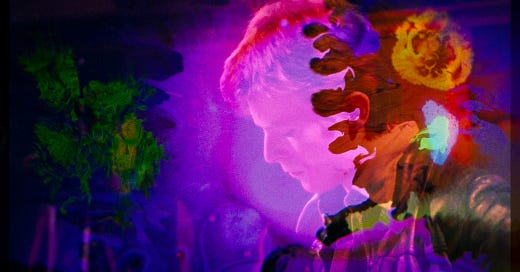“Time… one of the most complex expressions… It’s something that straddles past and future without ever being quite present… [and] you’re aware of a deeper existence. Maybe a temporary reassurance that indeed there is no beginning, no end, and all at once, the outward appearance of meaning is transcended, and you find yourself struggling to comprehend a deep, unformidable mystery. All is transient. Does it matter? Do I matter?”
Moonage Daydream opens with a monologue from David Bowie that features this quote. But before these questions are answered, we are launched into 150 minutes of constantly changing video and audio, in which time completely melts away. The movie is psychedelic, maximalist, and an exhausting journey through the different stages and eras of Bowie’s life, exclusively using his own words to tell the story. Part concert film, part experimental video, part interview, and part intricate media montage, Moonage Daydream paints a personal portrait of the icon, digging into the psyche of the man who transcended cultural standards visually and philosophically.
A few years ago, Gabriel Range’s David Bowie biopic Stardust hit theaters to a horrible reception. The film was a disaster - its portrayal of Bowie was so disrespectful and demeaning that his estate did not even grant it rights to his music, making it a nearly two-hour Bowie biopic without a single Bowie song. In contrast, Moonage Daydream succeeds everywhere the previous film failed. Director Brett Morgen exclusively uses Bowie’s music and entirely by-passes talking heads components. In fact, every spoken segment is Bowie himself, and Morgen doesn’t bother with any retrospective speculation about the more elusive aspects of Bowie’s life. He shows us only what David Bowie chose to share, making the film reflective, respectful, and responsible.
The documentary’s respect for its subject is one of the main reasons that Moonage Daydream is successful and true to its ambition. By exclusively using Bowie’s own voice and image, Morgen avoids placing his ego at the heart of the movie, a mistake often made in musician biopics and documentaries. As I discussed in my review of Elvis, biopic directors are so frequently self-righteous and obnoxious in their filmmaking that it seems as though they are trying to one-up the artistic talent of their subject with their own directorial style. Of course, Moonage Daydream is still highly stylized, but it feels as though it is a reinvigoration of Bowie’s spirit rather than a reimagination of him through the lens of a particular director’s style. The film prioritizes Bowie above all else, taking advantage of every medium of his work in a color-soaked and euphoric tribute.
Between the bouts of flashing color and psychedelic montage, Moonage Daydream dedicates a substantial part of its runtime to examining David Bowie’s fascination with the philosophical and psychological ramifications of the concept of celebrity. These conversations are often paired with footage of Bowie’s fans emulating his style, entranced with his performances, and both euphoric and distraught about their proximity to their hero. As the film comes to a close, Bowie continues to ponder his existential interest in fame, legacy, and death, and we finally get to hear his answer to the questions he poses at the very beginning.
“Yes, I do [matter],” he says, “Life is fantastic; it never ends, it only changes. Flesh to stone to flesh, and round and round. Best keep walking.”
Moonage Daydream was released on September 16 and is currently in US theaters.





Life remote control.